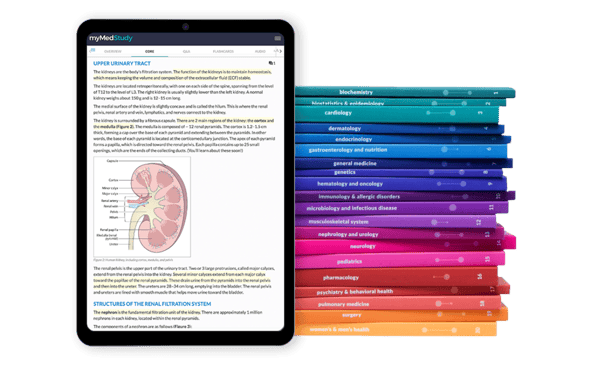
Are you in medical school and starting to think more deeply about what specialty to choose? To help you make an informed decision, we interviewed board certified physicians in each specialty who dish the details about their career.
In this feature, Aaron Calderon, MD explains the best part about being an Internist, the most challenging parts, and even what other specialties he considered before deciding on Internal Medicine. But first, we'll dive into the deets on IM!
The Deets on Internal Medicine
Internal Medicine doctors or “Internists” specialize in the nonsurgical care of adult patients. They specifically focus on the diagnosis, prevention, and treatment of diseases. In the outpatient setting they commonly take care of patients with diabetes mellitus, hypertension, lipid abnormalities, musculoskeletal/rheumatologic disorders, depression/anxiety, asthma/COPD, chronic kidney & liver diseases, anemia, infections, genitourinary issues, and skin problems, as well as making sure that patients receive the proper vaccinations and recommended screenings.
Those that work in the hospital commonly take care of patients with heart failure, pneumonia, urinary tract infections, chronic lung disease, liver and kidney disease, stroke, diabetes complications, gastrointestinal hemorrhage, malignancy, venous thromboembolic disease, fluid & electrolyte disorders, cognitive problems, substance abuse disorders, and palliative care.
How Long Does It Take To Become an Internal Medicine Doctor?
Internists require 3 years to finish their training. Afterward they have the option to complete additional fellowship training so they can subspecialize in a particular field. Common subspecialties include, cardiology, gastroenterology, pulmonary/ critical care medicine, hematology & oncology, rheumatology, endocrinology, infectious diseases, and nephrology.
Q&A with an Internist—Aaron Calderon, MD
 Career Focus: Internal Medicine section in the Medical Student Core
Career Focus: Internal Medicine section in the Medical Student Core
Q- Why Did You Choose to Become an Internal Medicine Doctor?
A- My specialty is Internal Medicine. I chose it for 3 main reasons:
1) You oversee taking care of the entire patient, which is very rewarding.
2) There are so many options to choose from. One can take care of patients solely in the hospital or clinic, both the hospital and clinic, and even subspecialize in many fields such as cardiology or rheumatology.
3) It is very intellectually challenging, and one never ceases to learn something new.
Q- What’s the Best Part about Being an Internal Medicine Doctor?
A- The variety of pathology and patients that I see is amazing. Additionally, I have a chance to really utilize my degree/education to the fullest. I also enjoy having close relationships with patients and helping them through some of the most scary and vulnerable times of their lives.
Q- What do you dislike the most about your specialty?
A- I love the patients and learning medicine in general. I dislike all the “paperwork” that is required for medical-legal and billing purposes.
Q- In addition to your chosen specialty, which other specialties were you thinking about pursuing?
A- I thought of several other specialties. I thought about pediatrics, but I realized that I enjoyed interacting with adults more. I also liked OB/GYN, but I did not want to limit my practice to solely taking care of women. Lastly, I thought about Family Medicine, but personally felt that it would be difficult to be excellent at so many things. Ultimately, Internal Medicine was the best mix for me, and I have enjoyed it for the last 25 years.
Study With the Medical Student Core
 Study with the Medical Student Study Strong System
Study with the Medical Student Study Strong System
At the beginning of each section in the Medical Student Core is a Career Focus feature that outlines the details of a career in that field. These sections present an overview of the specialty, as well as an interview with a specialist, that paint a clear picture of what your future holds should you venture down that path.
Want to check out the Medical Student Study Strong System? Start a free trial of the now and get the full Musculoskeletal section for 30 days.
An inside look at the Musculoskeletal section as part of the Medical Student Study Strong System
Read Our Other Career Focus Blogs
Interested in reading about careers in other specialties? Read these interviews with other docs who dish on the deets of their careers:


-gif.gif)
